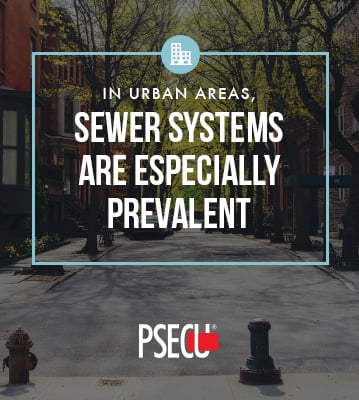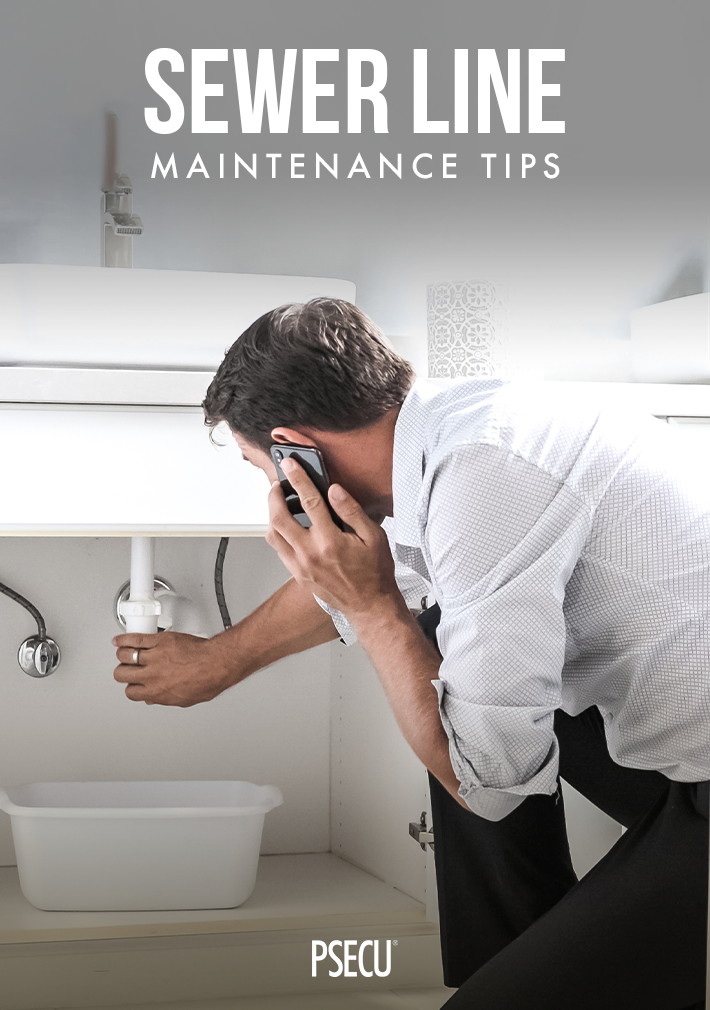Not all homes rely on well water and septic tanks for water treatment and access. If your home relies on city water, you should understand how your sewer system works and what you can do to maintain it.
How Sewer Systems Work
 In urban areas, sewer systems are especially prevalent.
In urban areas, sewer systems are especially prevalent.
These systems work by collecting wastewater from homes and businesses, and delivering it to wastewater treatment plants where it is treated and returned to the groundwater supply to be used again.
On a basic level, pipes lead from individual homes to a “sewer main” line that usually runs down the middle of the street. These lines are generally three to five feet in diameter. When access to the main sewage line is required, sewer covers above ground make it possible.
The main sewer lines continue to lead to larger and larger pipes until they flow into the treatment plant. When possible, the lines operate with help from gravity. When it’s not possible, lift stations or pumps below or above ground may be used to move the wastewater over hills and other natural obstacles.
Once the water enters the treatment center, it’s processed in stages — usually three — before being released back into the environment.
Having a basic understanding of the system may be helpful for proper maintenance and care on a personal level.
Signs of a Sewer Line Clog
Many signs of a sewer line clog are similar to those that accompany septic tank trouble, since the systems serve the same purpose of removing wastewater from the home. They may include:
- Sewage flowing back up through drains in the toilet, sink or tub
- Clogged drains and toilets that cannot be remedied by traditional de-clogging methods
- Gurgling noises coming from the toilet — this is usually a sign that a tree root has damaged the sewage line
- Slow drains that don’t respond to clog removal or treatment
If you suspect a clog, rapid action is recommended to prevent further damage. One of the first steps is to shut off the water at its source. If you’re unsure of where your shut-off valve is or how to shut off the water, calling a plumber may provide an answer. Turning off the water could help prevent further damage to your system, minimizing repair costs.
After you’ve turned off the water, contact a plumber or your sewage authority.
As with most other home maintenance tasks, prevention and knowledge are important. Take the time today to find your shut-off valve and cleanout line so you’ll be better prepared if an unexpected event takes place.
Sewer Line Maintenance Tips
While understanding how the sewage line works and what to do if trouble should arise are important, regular maintenance is also useful. Remember, prevention matters.
Unlike other systems that you interact with on a regular basis, the sewage line is easy to forget until something goes wrong, and it’s too late.
Residential main sewer lines can back up for a number of reasons, like those previously discussed. Understanding the type of sewer lines that keep your home operational will help in understanding what troubles you may face and learning how to prevent them:
- Clay Sewage Lines
 Homes built prior to the 1950s generally rely on clay sewer lines. The lines were installed using smaller sections of pipes with joints to hold them together. Because of the setup, there are many areas in clay sewer lines for tree roots to enter and block the water line. This is the most common problem these types of lines face.
Homes built prior to the 1950s generally rely on clay sewer lines. The lines were installed using smaller sections of pipes with joints to hold them together. Because of the setup, there are many areas in clay sewer lines for tree roots to enter and block the water line. This is the most common problem these types of lines face.
Over time, solids can stick to the tree roots, causing complete blockages. Professional care companies can snake these lines, which is recommended on an annual basis. In some cases, a chemical treatment may be required to destroy roots left behind.
- Cast Iron Sewage Lines
Homes built after the 1970s generally rely on heavy-duty cast iron pipes. These lines require fewer joints than other systems and are extremely strong, making them more resistant to common troubles like tree roots. Unfortunately, no system is perfect. Because the pipes are made from iron, rust and other deposits can form inside the pipe, which can cause blockages over time.
A professional can use a high-pressure water jet to clean the inside of the pipe. In many cases, this is recommended on an annual basis.
- Fiber Conduit Sewage Lines
Homes built between the 1950s and the 1960s were frequently fitted with fiber conduit sewage lines. Sometimes referred to as “Orangeburg,” these pipes were created using tar and rolled wood pulp.
Like cast iron lines, tree roots rarely affect these lines. However, the deformation of lines does take place over time. Because of the way the lines warp, the sewage flow can be negatively impacted.
It’s important to hire a professional to clean fiber conduit lines. This helps to minimize the effects of deformation until a replacement is required.
To keep your sewer line operating at an optimal level, talk to a local sewer and drainage company to discuss options and create a maintenance program that’s best for your sewer type and budget.

Read our other chapters
Chapter 1
Why Maintenance Matters and How to Budget for It
Chapter 2
Plumbing Maintenance — From Snaking a Main Drain to Dealing with Hard Water Clogs
Chapter 3
Well Maintenance — Water Well Maintenance Starts With Understanding Groundwater Basics
Chapter 4
Septic Tank Maintenance — Preventative Care for Your Tank and Spotting Warning Signs
Chapter 5
Sewer Line Maintenance — From Understanding How Systems Work to Spotting Clogs
Chapter 6
HVAC System Maintenance — Keeping Your Home Comfortable Throughout the Year
Chapter 7
Insulation — Better Insulating Your Home and Preventing and Addressing Drafts
Chapter 8
Home Exterior Maintenance — Saving Costs by Identifying Seasonal Tasks
Chapter 9
Home Improvement Ideas — Adding Value to Your Home and Getting a Return on Your Investment
Download all chapters as a PDF.
The content provided in this publication is for informational purposes only. Nothing stated is to be construed as financial or legal advice. Some products not offered by PSECU. PSECU does not endorse any third parties, including, but not limited to, referenced individuals, companies, organizations, products, blogs, or websites. PSECU does not warrant any advice provided by third parties. PSECU does not guarantee the accuracy or completeness of the information provided by third parties. PSECU recommends that you seek the advice of a qualified financial, tax, legal, or other professional if you have questions.
